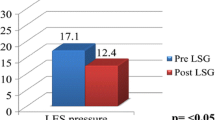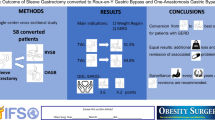Abstract
Background
Patients with obesity having GERD usually undergo Roux-en-Y gastric bypass (RYGB) as the procedure of choice. However, the emergence of one anastomosis gastric bypass (OAGB) as a less time-consuming operation with fewer complications offers a potential option for these patients.
Study Design
This randomized controlled trial included 80 patients (out of 457 screened) with mild-to-moderate GERD that were equally divided into two groups for OAGB and RYGB. GERD was diagnosed by 20-item questionnaire, upper endoscopy, 24-h pH monitoring, and manometry. Follow-up at 6 and 12 months was done.
Results
No significant differences were found between the two groups regarding demographic data, comorbidities, and weight loss. OAGB had less operative time and fewer complications. Both procedures had comparable favorable effects in reducing the GERD symptoms evidenced by upper endoscopy, 24-h pH monitoring, and manometry.
Conclusion
OAGB is a promising bariatric procedure in weight loss for patients with obesity having mild-to-moderate GERD (up to grade B esophagitis by Los Angeles score). Furthermore, wide-scale studies and on more severe degrees of GERD are required to fully understand its benefits in GERD patients with obesity.




Similar content being viewed by others
References
Wang Y, Yi XY, Gong L, et al. The effectiveness and safety of laparoscopic sleeve gastrectomy with different sizes of bougie calibration: a systematic review and meta-analysis. Int J Surg. 2018;49:32–8.
El-Hadi M, Birch DW, Gill RS, et al. The effect of bariatric surgery on gastroesophageal reflux disease. Can J Surg. 2014;57:139–44.
Naik RD, Choksi YA, Vaezi MF. Impact of weight loss surgery on esophageal physiology. Gastroenterol Hepatol. 2015;11(12):801–9.
Poublon N, Chidi I, Bethlehem M, et al. One anastomosis gastric bypass versus Roux-en-Y gastric bypass, remedy for insufficient weight loss and weight regain after failed restrictive bariatric surgery. Obes Surg. 2020;30:3287–94.
Ashrafi D, Osland E, Memon MA. Bariatric surgery and gastroesophageal reflux disease. Ann Transl Med. 2020;8(Suppl 1):S11.
Laffin M, Chau J, Gill RS et al. Sleeve gastrectomy and gastroesophageal reflux disease. Journal of Obesity 2013; Article ID 741097, 6 pages.
Mion F, Tolone S, Garros A, et al. High-resolution impedance manometry after sleeve gastrectomy: increased intragastric pressure and reflux are frequent events. Obes Surg. 2016;26:2449–56.
Wang FG, Yan WM, Yana M, et al. Outcomes of mini vs Roux-en-Y gastric bypass: a meta-analysis and systematic review. Int J Surg. 2018;56:7–14.
DuPree CE, Blair K, Steele SR, et al. Laparoscopic sleeve gastrectomy in patients with preexisting gastroesophageal reflux disease: a national analysis. JAMA Surg. 2014;149(4):328–34.
Fontan FM, Carroll RS, Thompson D et al. Current management of gastroesophageal reflux disease in the obese population-a review of the literature. Mini-invasive Surg 2020;4:29. https://doi.org/10.20517/2574-1225.2020.09
Altieri MS, Pryor AD. Gastroesophageal reflux disease after bariatric procedures. Surg Clin N Am. 2015;95:579–91.
Navarini D, Madalosso CAS, Tognon Ap et al. Predictive factors of gastroesophageal reflux disease in bariatric surgery: a controlled trial comparing sleeve gastrectomy with gastric bypass. Obesity Surgery 2020;30:1360–7.
Barr AC, Frelich MJ, Bosler ME, et al. GERD and acid reduction medication use following gastric bypass and sleeve gastrectomy. Surg Endosc. 2017;31:410–5.
Suter M. Gastroesophageal reflux disease, obesity, and Roux-en-Y gastric bypass: complex relationship—a narrative review. Obes Surg. 2020;30:3178–87.
Wang JH, Luo JY, Dong L, et al. Composite score of reflux symptoms in diagnosis of gastroesophageal reflux disease. World J Gastroenterol. 2004;10(22):3332–5.
Gyawali CP, Kahrilas PJ, Savarino E et al. Modern diagnosis of GERD: the Lyon Consensus. Gut 2018;0:1–12.
Kim JH. How to interpret ambulatory 24 hr esophageal pH monitoring. J Neurogastroenterol Motil. 2010;16:207–10.
Felsenreich DM, Kefurt R, Schermann M, et al. Reflux, sleeve dilation, and Barrett’s esophagus after laparoscopic sleeve gastrectomy: long-term follow-up. OBES SURG. 2017;27:3092–101.
Braghetto I, Csendes A. Prevalence of Barrett’s esophagus in bariatric patients undergoing sleeve gastrectomy. OBES SURG. 2016;26:710–4.
Braghetto I, Lanzarini E, Korn O, et al. Manometric changes of the lower esophageal sphincter after sleeve gastrectomy in obese patients. OBES SURG. 2010;20:357–62.
Boru CE, Greco F, Giustacchini P, et al. Short-term outcomes of sleeve gastrectomy conversion to R-Y gastric bypass: multi-center retrospective study. Langenbeck’s Arch Surg. 2018;403:473–9.
Gálvez-Valdovinos R, Cruz-Vigo JL, Marín-Santillán E, et al. Cardiopexy with ligamentum teres in patients with hiatal hernia and previous sleeve gastrectomy: an alternative treatment for gastroesophageal reflux disease. Obes Surg. 2015;25:1539–43.
Musella M, Vitiello A, Giovanna Berardi G, et al. Evaluation of reflux following sleeve gastrectomy and one anastomosis gastric bypass: 1-year results from a randomized open-label controlled trial. Surg Endosc. 2020. https://doi.org/10.1007/s00464-020-08182-3.
American Society for Metabolic and Bariatric Surgery Clinical Issues Committee. American Society for metabolic and bariatric surgery position statement on global bariatric healthcare. Surg Obes Relat Dis. 2011;7(6):669–71.
Rentz AM, Kahrilas P, Stanghellini V, et al. Development and psychometric evaluation of the patient assessment of upper gastrointestinal symptom severity index (PAGI-SYM) in patients with upper gastrointestinal disorders. Qual Life Res. 2004;13:1737–49.
Sami SS, Ragunath K. The Los Angeles classification of gastroesophageal reflux disease. Video J Encycl GI Endosc. 2013. https://doi.org/10.1016/S2212-0971(13)70046-3.
Kahrilas PJ, Bredenoord AJ, Fox M, et al. The Chicago classification of esophageal motility disorders. Neurogastroenterol Motil. 2015;27(2):160–74.
Borbély Y, Schaffner E, Zimmermann L, et al. De novo gastroesophageal reflux disease after sleeve gastrectomy: role of preoperative silent reflux. Surg Endosc. 2019;33:789–93.
Garg H, Vigneshwaran B, Aggarwal S, et al. Impact of concomitant laparoscopic sleeve gastrectomy and hiatal hernia repair on gastro-oesophageal reflux disease in morbidly obese patients. Journal of Minimal Access Surgery. 2017;13:103–8.
Tai CM, Lee YC, Wu MS el al. The effect of Roux-en-Y gastric bypass on gastroesophageal reflux disease in morbidly obese Chinese patients. Obes Surg 2009;19:565–70.
Tai CM, Huang CK, Lee YC, et al. Increase in gastroesophageal reflux disease symptoms and erosive esophagitis 1 year after laparoscopic sleeve gastrectomy among obese adults. Surg Endosc. 2013;27:1260–6.
Carter PR, Leblank KA, Hausmann MG, et al. Association between gastroesophageal reflux disease and laparoscopic sleeve gastrectomy. Surg Obes Relat Dis. 2011;7:569–72.
Ali M, El Chaar M, Ghiassi S, et al. American Society for Metabolic and Bariatric Surgery updated position statement on sleeve gastrectomy as a bariatric procedure. Surg Obes Relat Dis. 2017;13:1652–7.
Burgerhart JS, Schotborgh CAI, Schoon EJ, et al. Effect of sleeve gastrectomy on gastroesophageal reflux. Obes Surg. 2014;24:1436–41.
Tolone S, Cristiano S, Savarino E, et al. Effects of omega-loop bypass on esophagogastric junction function. Surg Obes Relat Dis. 2016;12:62–9.
Pallati PK, Shaligram A, Shostrom VK, et al. Improvement in gastroesophageal reflux disease symptoms after various bariatric procedures: review of the bariatric outcomes longitudinal database. Surg Obes Relat Dis. 2014;10:502–7.
Varban OA, Hawasli AA, Carlin AN, et al. Variation in utilization of acid-reducing medications at 1 year following bariatric surgery: results from the Michigan Bariatric Surgery Collaborative. Surg Obes Relat Dis. 2015;11(1):222–8.
Stefanidis D, Navarro F, Augenstein VA, et al. Laparoscopic fundoplication takedown with conversion to Roux-en-Y gastric bypass leads to excellent reflux control and quality of life after fundoplication failure. Surg Endosc. 2012;26:3521–7.
Author information
Authors and Affiliations
Corresponding author
Ethics declarations
Ethics Approval
All procedures performed in studies involving human participants were in accordance with the ethical standards of the institutional and/or national research committee and with the 1964 Helsinki declaration and its later amendments or comparable ethical standards.
Informed Consent
Informed consent was obtained from all individual participants included in the study.
Conflict of Interest
The authors declare no competing interests.
Additional information
Publisher's Note
Springer Nature remains neutral with regard to jurisdictional claims in published maps and institutional affiliations.
Key Points
• No significant differences between the two groups in weight loss at 1 year postoperatively.
• OAGB had less operative time and fewer complications.
• OAGB and RYGB had similar effects in reducing mild-to-moderate GERD evidenced by UGI, 24-h pH monitoring, and manometry.
Rights and permissions
About this article
Cite this article
Eskandaros, M.S., Abbass, A., Zaid, M.H. et al. Laparoscopic One Anastomosis Gastric Bypass Versus Laparoscopic Roux-en-Y Gastric Bypass Effects on Pre-existing Mild-to-Moderate Gastroesophageal Reflux Disease in Patients with Obesity: a Randomized Controlled Study. OBES SURG 31, 4673–4681 (2021). https://doi.org/10.1007/s11695-021-05667-5
Received:
Revised:
Accepted:
Published:
Issue Date:
DOI: https://doi.org/10.1007/s11695-021-05667-5




